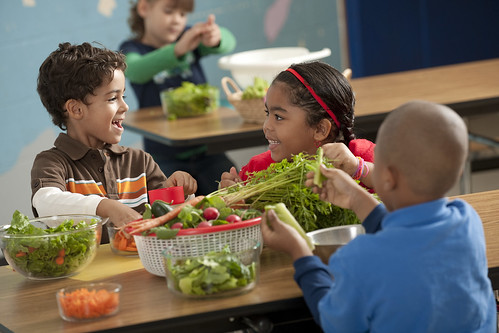
Although about 21 million children nationwide receive free and reduced-priced meals through our National School Lunch Program, only about 3.5 million meals are served through the Summer Food Service Program (SFSP) on a typical day. Closing this gap and ensuring that disadvantaged children do not go hungry during the summer months is a goal that USDA can only achieve through work with our partners.
One of the ways we’re strengthening partnerships is through our StrikeForce Initiative which helps us target state partners to work with across the country including universities and colleges. A great example of this initiative at work is the Alabama Department of Education teaming up with Tuskegee University, a Historically Black University in Alabama, which now sponsors four community-based summer feeding sites in Macon County where disadvantaged kids can get a free and nutritious summer meal.
The drive to have summer sites in Macon County was led by the First Lady of Tuskegee University, Patricia Rochon. Bringing Historically Black Colleges and Universities (HBCUs) on board with efforts to prevent summer hunger is important as those institutions often have a more unique relationship with the folks in their local communities than the average place of higher education. We want more of these universities to get involved.
In 2012, 390,000 children in Alabama received meals through the National School Lunch Program, while 32,900 of those were fed in the summer through the SFSP. These statistics mean that 91 percent of school-age children were not fed during the summer months. Of the 23 Strikeforce counties in Alabama, there were six counties that did not have an SFSP or Seamless Summer meal service for 2012. Thanks to our hard-working Alabama partners, we have reduced that number to one county in 2013.

I’m grateful that the desire to help close the summer meals gap is being embraced outside of Alabama as well. Recently Alcorn State University in Mississippi became the second Historically Black University in Mississippi – along with Jackson State University—to become a part of the SFSP.
In fact, HBCUs and 1890 colleges and universities in other Southeastern states, such as Florida, Georgia, Kentucky, Mississippi, North Carolina, South Carolina, and Tennessee have also joined in the fight against child hunger by becoming summer sponsors and/or hosting sites where kids can play and get a free nutritious meal.
In planning for 2014, we hope to reach even more colleges and universities across the nation in underserved areas encouraging their participation as a summer sponsor or site. There is much work to do but the Food and Nutrition Service and our partners are making progress in providing children in underserved areas with access to nutritious meals during the summer months. It takes all of us working together to make sure the SFSP works to feed children when school is out.
For more information on how the Summer Food Service Program helps keep kids from going hungry when school is out, please visit our summer web page.


